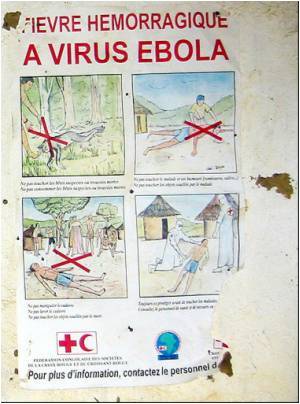Not only am I a horrible blogger (shh, I know!), but...well...
I'm obsessed with Ebola.
Now, let me back up a few steps and tell you why:
Infectious diseases are my "thing". They've always fascinated me, in the ways that they affect their hosts, in their genius, evolutionary design, and in their strength. When I first learned about Ebola, I was in the Stanford morgue with my biology teacher. I was a freshman in high school, and was the only person in my class that could handle the trip. My teacher didn't doubt that, either. Not only was I the only freshman in the class, but I was getting the highest grade. She might have also thought I would have been interested in going since I was a suburban punk with an open fascination for all things morbid and macabre.
My future in science was sprawled out in front of me, sliced open exposing the internal environment of what you could associate that feeling after you accidentally sleep with your mouth open all night: pooling liquids, stressed tissues and an attractive browning in color. These are all minor details in this story, but I'm sure you can forgive me for indulging in such memories.
During the first autopsy review, I asked what the most interesting cause of death was that they had seen to date. Obviously, no one had died from Ebola in suburban-chic Palo Alto, but a laundry list of infectious diseases was recited.
Fast forward to many years later. Not so much outwardly punk rock anymore (forever at heart, though!), I sit in my Virology class in college, amorously listening to lectures about some of the world's deadliest things. Sure, I knew about Ebola by then, through scientific papers and trashy dramatizations of science, but it was only after those lectures that I truly knew I was obsessed.
Since then, my candid crush on Ebola has ruined a number of dates, relationships and any hope that I had (actually never) had to be considered somewhat normal. So what if I am fascinated with something that has killed tons of people!?
Yea, ok. I get it. I probably should not be on the internet, professing my lust and admiration for a virus. But I did. Lets get to the point, shall we?
Ebola, classified as filoviridae, is a really brutal virus that has been in the news a lot lately. Known to cause hemorrhagic fevers and be extremely pathogenic and fatal, Ebola still has a lot of unknowns associated with it. Although the mode of transmission is thought to be through direct contact with fluids or tissues from an infected person or animal, virologists are still not completely sure. The only way to prevent a massive outbreak is to isolate all infected individuals. Scientists are not even sure what the vector could be, although many have researched various bat species that reside in areas surrounding previous outbreaks.
When you have Ebola, the endothelial cells of blood vessles, mainly surrounding orifices, weaken and lose the ability to cause coagulation, which is part of the healing process. Eventually, these tissues break down completely, causing bleeding from any (or all) of your orifices. Another website describes the symptoms in gruesome detail, as if reading the liner notes for a black metal album:
"The first symptoms are a low-grade headache. This quickly progresses to a debilitating fever and muscle pain. Then things get truly bad as the major organs, the digestive tract, the skin, the eyes, the gums, all begin to break down and bleed. The body begins to dissolve. Blood pours out of body orifices while the victim writhes in pain. Death usually comes from systemic shock and blood loss. Researchers were shocked when they first autopsied people who died from these fevers. Their insides had literally melted into a necrotic mess of black fluid."
About a year ago, a research scientist in Germany earned international attention because she carelessly stabbed her finger while injecting mice with the Ebola virus for treatment and vaccination experimentation. Luckily, her team immediately went into action, isolated her and treated her with a vaccine that was still in the process of being developed.
Rumor has it that she is alive and well. Oh goody!
Three weeks ago, Ebola made international headlines again when scientists in Boston published research showing an effective cure for Simian (monkey) Ebola. Their research achieved 100% protection against death after the monkeys were injected with a seriously lethal dose of the virus. This has nothing to do with infected humans, but will lead the way for future research and vaccine development.
I am always fascinated at how tirelessly research scientists work to solve major problems, such as viruses with 90% mortality rates, cancer or Alzheimer's...yet, there is always some idiot that is working to keep the problem going, despite any efforts to fix it.
A perfect example of this is the bushmeat industry. Just today, reporters uncovered a serious threat to the spread of many deadly viruses in Paris due to the weekly importation of bushmeat from monkeys, crocodiles and porcupines. My favorite part of that article is this:
"Madame Toukine, an African woman in her 50s, said she receives special deliveries of crocodile and other bushmeat on weekends. She declined to give her full name, fearing she could be arrested."
Oh yes. I know I engage in potentially deadly trade that is incredibly illegal, but I'll give you my last name and the location of my quaint little bushmeat-slinging shoppe.
Also, this:
"Of 134 people searched, 9 had bushmeat. Another 83 had livestock or fish. But people with bushmeat had the largest amounts: one passenger had 51 kilograms (112 pounds) of it — and no other luggage. Most of the bushmeat was smoked and arrived as dried-out carcasses. Some animals were identifiable, though scientists boiled the remains of others and reassembled the skeletons to determine the species."
Mmm! Nothing gets my salivary glands excited like unidentifiable jungle carcass!
Also, if you have the time, check out this amazing revamping of a classic: Curious George and the Ebola Virus.
Also, if you have the time, check out this amazing revamping of a classic: Curious George and the Ebola Virus.





Awesome!Great post, it kinda got me into Ebola too =P
ReplyDelete